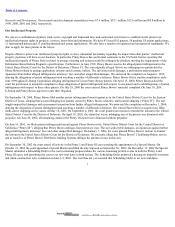Stamps.com 2002 Annual Report Download - page 18
Download and view the complete annual report
Please find page 18 of the 2002 Stamps.com annual report below. You can navigate through the pages in the report by either clicking on the pages listed below, or by using the keyword search tool below to find specific information within the annual report.
Table of Contents
our Internet Postage services to any new requirements or specifications or if the US Postal Service were to discontinue Internet Postage as an
approved postage method. Alternatively, the US Postal Service could introduce competitive programs or amend Internet Postage requirements
to make certification easier to obtain, which could lead to more competition from third parties or the US Postal Service itself. If we are unable
to compete successfully, particularly against large, traditional providers of postage products like Pitney Bowes who enter the online postage
market, our revenues and operating results will suffer.
In addition, US Postal Service regulations may require that our personnel with access to postal information or resources receive security
clearance prior to doing relevant work. We may experience delays or disruptions if our personnel cannot receive necessary security clearances
in a timely manner, if at all. The regulations may limit our ability to hire qualified personnel. For example, sensitive clearance may only be
provided to US citizens or aliens who are specifically approved to work on US Postal Service projects.
If we are unable to compete successfully, particularly against large, traditional providers of postage products such as Pitney Bowes
who enter the online postage markets, our revenues and operating results will suffer.
The market for Internet Postage products and services is new and is intensely competitive. At present, Pitney Bowes has a software-based
product commercially available. If any of our competitors provide the same or similar service as we provide, our operations could be adversely
impacted.
Internet Postage may not be adopted by customers. These customers may continue to use traditional means to purchase postage, including
purchasing postage from their local post office. If Internet Postage becomes a viable market, we may not be able to establish or maintain a
competitive position against current or future competitors as they enter the market. Many of our competitors have longer operating histories,
larger customer bases, greater brand recognition, greater financial, marketing, service, support, technical, intellectual property and other
resources than us. As a result, our competitors may be able to devote greater resources to marketing and promotional campaigns, adopt more
aggressive pricing policies and devote substantially more resources to Web site and systems development than us. This increased competition
may result in reduced operating margins, loss of market share and a diminished brand. We may from time to time make pricing, service or
marketing decisions or acquisitions as a strategic response to changes in the competitive environment. These actions could result in reduced
margins and seriously harm our business.
If the market for Internet Postage develops, we could face competitive pressures from new technologies or the expansion of existing
technologies approved for use by the US Postal Service. We may also face competition from a number of indirect competitors that specialize in
electronic commerce and other companies with substantial customer bases in the computer and other technical fields. Additionally, companies
that control access to transactions through a network or Web browsers could also promote our competitors or charge us a substantial fee for
inclusion. Our competitors may also be acquired by, receive investments from or enter into other commercial relationships with larger,
better-established and better-financed companies as use of the Internet and other online services increases. In addition, changes in postal
regulations could adversely affect our service and significantly impact our competitive position. We may be unable to compete successfully
against current and future competitors, and the competitive pressures we face could seriously harm our business.
If we do not respond effectively to technological change, our services could become obsolete and our business will suffer.
The development of our services and other technology entails significant technical and business risks. To remain competitive, we must continue
to enhance and improve the responsiveness, functionality and features of our online operations. The Internet and the electronic commerce
industry are characterized by rapid technological change; changes in user and customer requirements and preferences; frequent new product and
service introductions embodying new technologies; and the emergence of new industry standards and practices.
14
2003. EDGAR Online, Inc.
























